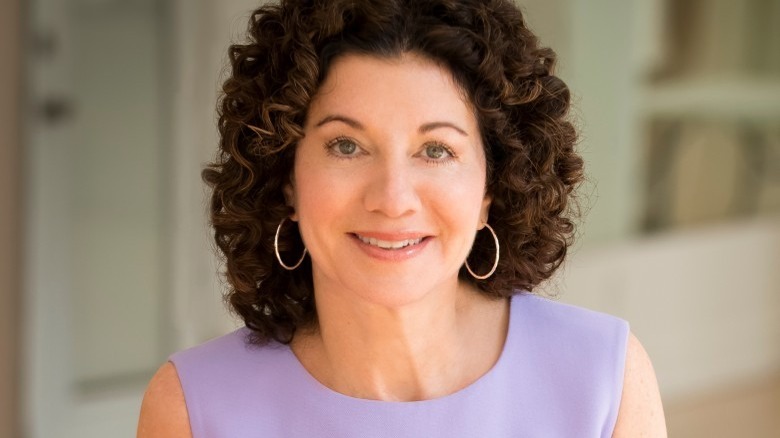How To Know If Someone You Love Is A Narcissist
We may receive a commission on purchases made from links.
In an age of selfies and social media, it's easy to see why the term narcissist is liberally tossed around. But just like other personality traits such as kindness or empathy, narcissism isn't something you either have or you don't. Instead it's a trait that lives on a spectrum, with one end being fairly benign and the other end being categorized as a full-blown disorder.
It's a spectrum almost everyone falls on at some point, and the very fact that we even brush our hair or get dressed in the morning shows that each of us at least cares a little about how the world perceives us. Almost everyone knows someone who carries themselves with an air of superiority or who feels entitled to certain things. In fact, according to psychiatrist Dr. Ayo Gathing, most successful people in history can attribute their accomplishments at least in part to narcissistic traits.
But what happens when a person has too many of those traits, or they have narcissistic tendencies so severe that their lives or personal relationships are impaired? There's a big difference between someone who loves to hear themselves talk, and a person who actually has what's called Narcissistic Personality Disorder. So we asked the experts to weigh in on what exactly defines Narcissistic Personality Disorder, and what — if anything — people can do if someone they love is a narcissist.
What symptoms do narcissists present?
Dr. Fran Walfish, a Beverly Hills family and relationship psychotherapist and author of The Self-Aware Parent, told The List that, although about a third of the population are narcissists, people who are diagnosed with Narcissistic Personality Disorder are actually quite rare. In order to diagnose NPD, a person must exhibit at least five of the nine criteria laid out by the Diagnostic Manual For Mental Disorders 5th Edition. And the symptoms must impair one or more aspects of their life.
Narcissists exaggerate their own importance
Dr. Gail Saltz, a psychoanalyst and author of The Power of Different: The Link Between Disorder and Genius, told The List it is very common for highly successful people to have narcissistic traits. However, just owning one's own success does not a narcissist make. Some extremely successful people may be confident in their abilities, but classifying them as narcissists is inaccurate unless that confidence has no foundation.
Dr. Saltz, who has shared her expertise on Yahoo! News and CNN, said she knows people speculate about certain celebrities having narcissistic traits all the time, but saying they have Narcissistic Personality Disorder might not be accurate. A CEO of a successful company might recognize his or her own charisma and take pride in their negotiating abilities. Being self-absorbed can give people the personal focus they need to succeed. But narcissism only comes into play when these abilities are overestimated. A narcissist not only owns his or her accomplishments, but has an arrogance that leads them to think they are above others and that they have accomplished more than they actually have.
Narcissists may have a preoccupation with fantasies of success, power, beauty, intelligence, and romance
Dr. Ayo Gathing, who authored The Modern Trophy Wife, said some narcissists are obsessed with their idea of a perfect life. They might describe their relationships as "fairy tale romances" or they think they will live happily ever after no matter what. They believe that they will have some magical good fortune like winning the lottery or becoming an overnight star or finding extreme success. These ideas consume them, and they believe they will get these things because they are owed.
Narcissists may think that they are superior to others
Because the narcissist exaggerates his or her own importance in the world, they also see themselves as better than most other people. The Modern Trophy Wife author Dr. Ayo Gathing told The List narcissists tend to only associate with those who they feel are equally special or who are in the upper echelon of society.
That arrogance is the difference between owning their own strengths and becoming narcissistic. It's that sense that they are superior that leads them to treat people poorly if they consider them to be beneath them. Waitstaff and assistants are usually the ones who most often bear the brunt of the narcissist. But narcissists often try to make their partners feel inferior as well, behaving as though other people just aren't as smart or talented as they are and sometimes becoming angry when they don't feel others are rising to their level.
Narcissists often demand attention and admiration
Maintaining an inflated ego of such a great magnitude isn't an easy job for one person. Dr. Ayo Gathing said narcissists often need constant admiration and affirmation from those around them that they are smart, attractive, or talented. If they don't get the admiration they crave, they can withdraw or even throw tantrums to get sufficient attention.
They simultaneously disregard the effect of their behavior on other people, yet highly value others' opinions. The narcissist often can't handle it if other people don't think they're as great as they believe themselves to be.
Narcissists tend to have an unreasonable sense of entitlement
Narcissists feel entitled to better treatment because they believe they are truly more special than others. Melanie Tonia Evans, founder of the Narcissistic Abuse Recovery Program, said this can even manifest in a relationship as infidelity.
The narcissist feels entitled to getting everything they want regardless of the effect on other people, so they will place blame on their partners, rationalizing and twisting facts to fit their distorted reality. They are known to frame situations and lies so that their partner feels like they might be the one who is responsible.
Narcissists take advantage of others
Dr. Ayo Gathing told The List that narcissists often exploit other people to get what they want. They might enter a relationship with someone they aren't interested in just for money, fame, or status. But they have no problem ditching that person as soon as they get what they want, or if those selfish expectations aren't being met — regardless of how it makes the other person feel. They are users, draining people of resources without regard to that person's well-being, often leaving a shell of the former person in their wake.
Narcissistic Abuse Recovery Program founder Melanie Tonia Evans, who specializes in narcissism recovery, said narcissists truly think they are deserving of everything that is yours, whether that means resources, time, possessions, or energy. They use people up like objects and toss them away once they've been reduced to a shell of their former self. The narcissist is merely trying to use other people to fill a never-ending void within themselves.
Narcissists have a lack of empathy
This is the trait that psychotherapist Dr. Fran Walfish told The List is the true test of a narcissist, and also the trait that stands in the way of change. "The true marker for a narcissistic personality is someone who is missing the component of their personality that has the ability to imagine the impact of their own behavior on other people," she said.
Psychiatrist Dr. Ayo Gathing said that people often mistakenly assume that narcissists have a total lack of empathy to the point of sociopath behavior, when that typically isn't the case. Most narcissists have a shred of empathy, but they get in their own way. They are so into themselves that it's hard for them to recognize other people's ideas or feelings as valid. They don't necessarily want to hurt people, but they don't often realize — or particularly care — if they do. That's what makes it hard for a narcissist to get help on their own. They rarely see the validity of someone else telling them that they are the problem.
Narcissists often envy others
The narcissist is both envious of others and believes that others are envious of him or her. Psychiatrist Dr. Ayo Gathing told The List that the key component and cause of narcissism is insecurity. Deep down they are so worried that they aren't enough that they overcompensate. They mask that quiet voice of insecurity by loudly proclaiming their own success.
But it's just a coping mechanism, and that same insecurity breeds extreme envy in narcissists. Most of them truly don't think they are successful or beautiful or powerful enough, so when they see another person succeeding, it's like salt in that insecure wound. They think that if another person has success that it takes away from their own success. When confronted with bad behavior, narcissists will often rationalize that the critic is simply jealous of them. They simply don't want to see their own shortcomings.
Narcissists are arrogant
Arrogance is probably the easiest attribute to identify in a narcissist. But again, psychoanalyst Dr. Gail Saltz said being arrogant does not necessarily mean the person has NPD. The difference is when that arrogance negatively affects their life. Not being able to keep jobs or maintain relationships is the true test as to whether a person is a narcissist or is just a little full of themselves.
What causes a person to be a narsissist?
There are debates as to what exactly causes a person to become a narcissist. Is it nature, nurture, or a combination of both? Psychoanalyst Dr. Gail Saltz said there is no real answer, and it is most likely a combination of genetic pre-disposal to certain personality traits and external triggers.
However, Dr. Fran Walfish told The List she firmly believes the narcissism seeds are planted in early childhood, and parents can be forming those tendencies in their children as early as the toddler days. Either a parent is too harsh on the child, never being satisfied with anything the child does to the point that their love feels conditional, or they are too indulgent, building a false sense of entitlement in their child. It's the teacher's fault if the child makes a bad grade, or the coach is an idiot for not starting the child on the soccer team.
Narcissistic parents tend to see their children as an extension of themselves, so they often demand perfection or see perfection that isn't there. Because of that, they are more likely to raise narcissistic children.
Siblings can help abate narcissistic tendencies
As controversial as it sounds, psychoanalyst Dr. Fran Walfish said children who grow up without siblings often emerge into adulthood with a thread of narcissism because they never had to share their parents' attention or defer to another person on their level in the household.
The letdown and disappointment that siblings sometimes experience actually helps them deal with conflict as adults. That doesn't mean that all only children are narcissists, of course — just that they are more susceptible to narcissistic tendencies.
Parents need to balance praise with responsibility to avoid turning their children into narcissists
Another trap parents fall into is not giving their children enough responsibility. Psychoanalyst Dr. Fran Walfish told The List that doing chores and cleaning up their own messes are essential developmental lessons for children. Those who escape these responsibilities during childhood become adults who harbor a sense of entitlement, which could potentially lead to them becoming narcissists. They have an expectation for others to pick up their slack.
Dr. Walfish said the personality begins to truly take shape by the time a child is 7 years old. By adolescence, their character and personality have solidified, and it takes more work to chip away at the powerful defenses they've built up. Psychiatrist Dr. Ayo Gathing told The List that kids who grow up privileged or without confidence suffer the most. "The number one tip I give parents is don't be afraid to make your child upset," she said. It's healthy to let kids feel disappointment, so that they learn early on about ways to deal with those feelings. Letting them fail in a safe place where they are loved unconditionally is the best way to help them build confidence.
Parents should balance support and model empathy, but let children know when their actions or behaviors need to change. The love is unconditional, but their actions have consequences. Dr. Gathing continued, "I always say they're already human. Teach them to be humane."
To avoid raising narcissists, parents should give focused attention to their kids
Psychiatrist Dr. Ayo Gathing said parents have moved away from constructive criticism to pacification. It's easier to hand over a tablet to make their kids happy than it is to spend a few minutes talking to them.
She tells parents to put their phones down, turn off the TV, and spend 20 minutes just talking to their kids. Being in the same room doesn't mean that time spent together has value. She said parents who give their kids individual attention have children who grow into healthier, more secure adults.
Narcissists are, in a way, masking an injury
Psychiatrist Dr. Ayo Gathing shared that narcissistic personalities are big and loud because they are attempts at quieting deep insecurities. At the core of every narcissist is someone who is hurting. She said narcissists by nature don't take criticism well, and they commonly lash out at the person who is trying to help them. They often suffer from addiction because they try to use something they can control to mask their pain.
It's like a person whose leg is caught in a bear trap, but they pretend that the trap is a fancy accessory. When someone tries to call them on their behavior, it's a direct jab to that injured leg and they'll often lash out with all their might, not unlike a wounded animal. It's almost a fight or flight instinct for them to try and defend that injury. If someone in their life tries to tell them that they might have a problem, narcissists often fly into a rage and, instead, say anything they can in order to hurt that person. In other cases, they completely shut that person down and refuse to talk to them.
Is narcissism treatable or curable?
Psychoanalyst Dr. Gail Saltz said NPD is one of the most difficult disorders to treat simply because the very nature of the symptoms prevents people from seeing the benefit of treatment. One approach is to have their circle of friends, family members, and co-workers gently show them concrete ways that the disorder is harming them. Talking about how it's impairing their work and relationships or how it's resulting in constant anger or depression can sometimes nudge the sufferer in the right direction.
But Dr. Saltz stresses that it is very hard to get someone to see these points without taking them as a criticisms. She usually sees NPD patients come to treatment for other problems like depression. They get tired of constantly feeling disappointed and that extreme sense of self-preservation is sometimes what saves them. They can start treatment for depression, but an experienced therapist can begin to make progress on the narcissism at the same time.
She said the narcissistic traits a person exhibits greatly affects their chances of success in therapy. A person with a lot of impulsivity is more likely to bolt if they hear something they don't like in a session, making it difficult to keep them in treatment.
What if someone you love is a narcissist
People throw the term "narcissist" around to describe people they know — even celebrities are labeled as having Narcissistic Personality Disorder because of some of the traits they exhibit. But Dr. Gail Saltz said it's impossible to diagnose NPD without proper evaluation from a professional. However if someone you love exhibits some of these signs and it's affecting your life, then it's time for a change.
How you can get help if you're with a narcissist
Melanie Tonia Evans, Narcissistic Abuse Recovery founder, told The List that once a person has determined that he or she is in any type of abusive relationship, the first step is to seek therapy — and not necessarily therapy for the narcissist.
Self-empowerment is the best tool for a person who is dealing with a narcissist. By nature, narcissistic behavior tears others down, and it's hard not to listen when someone constantly berates you or points out your faults. You'll need strength whether you stay and try to help or you decide to leave.
Care for yourself as you deal with the narcissist in your life
Confronting a narcissist is like going into battle, and it's the ultimate example of tough love. Narcissistic Abuse Recovery founder Melanie Tonia Evans said the first order of business is to do some strength training to empower yourself and build up the self-confidence that the narcissist has broken down. The second part is to make sure you have a support network of trusted family and friends to lean on. You need an army of people who know about the abuse and who are there to support you if you decide to leave.
Dr. Ayo Gathing said to be prepared for the narcissist to lash out when confronted, but to stay strong and don't take what they say to heart. Realize this is a wounded person who is reflecting their own self-doubt and self-loathing back onto you.
Gaining independence from a narcissist
Narcissistic Abuse Recovery founder Melanie Tonia Evans said partners who are being abused should make sure they have money and living arrangements secured in case they need to leave. They should see a domestic violence agency for advice and resources, and they should also be prepared for a volatile aftermath.
Being independent and able to take care of oneself takes vital power away from the narcissist. The narcissist may try to make their partner's life miserable by destroying his or her reputation, or by lying and even faking remorse to draw their victim back in. Preparation is the key to overcoming the brutal backlash.
Confronting the narcissist
Dr. Gail Saltz warns people to approach narcissists with caution. The knee-jerk reaction most narcissists have to criticism is to lash out and shut down. She said that, rather than being combative or playing into their ego, the best approach is to come from a place of genuine concern for their well-being, specifically pointing out the ways you see them suffering. Use "I" statements and tell them it hurts you to see them losing friends or getting fired from their jobs. Even this can be seen as a criticism though, so expect a big push back. But consistency, patience, and sincerity are the best tools.
Dr. Ayo Gathing told The List the amount of empathy the narcissist lacks must be reflected ten-fold from the person confronting them. Empathizing with the narcissist and understanding that they are hurting can help partners gain perspective. But it doesn't mean that the narcissist's actions don't have consequences. Understanding the behavior isn't the same as excusing it. Empathy and reflection are tools to combat the symptoms of the disorder. Calmly let them know that if they say hurtful things or behave violently, you will not be able to have a relationship with them.
The narcissist needs to want to change
Balancing self-care with empathy is the job of the person who is asking for a change. But the responsibility to change falls completely on the narcissist. Psychiatrist Dr. Ayo Gathing said they must be highly motivated to change, and that unfortunately doesn't happen often. Most of the time change starts because the narcissist hits rock bottom in their romantic relationships, in their family life, or at work.
Stress that this concern for their well-being comes from a place of love, and ask how they see things. "It's one of the hardest disorders to get people to gain insight on," Dr. Gathing said. The challenge is that the narcissist lacks the ability to have introspection. But that's the only thing that can help them overcome the black hole of their disorder. It's like asking someone who is nearly blind to read an eye chart in order to restore their sight. It's incredibly difficult, but not impossible.
How much are you willing to take to help a narcissist?
Narcissists are drawn to all types of personalities, and all types of personalities can be drawn to narcissists. When two narcissists are drawn together, it's typically a volatile combination that self destructs quickly. The most common pairing is the narcissist and the person with very low self-esteem because it's easier for the person with low self-esteem to believe the criticisms of the narcissist, Dr. Ayo Gathing told The List. But that is also the most toxic combination. The person who will typically have the best success of igniting a change is someone who is very secure in themselves. A person who is patient and loving, but who can also set healthy boundaries, is the person who might see results in their partner.
Psychotherapist Dr. Fran Walfish said the first step is seeing if the narcissist might budge. If there's too much rigidity and the possibility of change is slim, the victim of a narcissist has to ask themselves whether they are honestly prepared to give more in the relationship than they will ever get back. If they choose to adjust their expectations and "accept crumbs instead of a whole slice of pie," then those letdowns and disappointments won't sting as badly.
"But do you really want to do that?" Dr. Walfish asked. "I think everyone deserves an equal full slice of the pie."
























